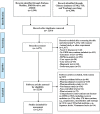Chinese herbal medicines in the treatment of ulcerative colitis: a review
- PMID: 35379276
- PMCID: PMC8981751
- DOI: 10.1186/s13020-022-00591-x
Chinese herbal medicines in the treatment of ulcerative colitis: a review
Abstract
Objective: To investigate how the ulcerative colitis (UC) be treated with Chinese herbal medicines (CHM), using Chinese medicine (CM) pattern (zheng) identification, in the current clinical practice.
Methods: A total of 7 electronic databases were systematically searched for UC clinical studies with CHM interventions (including single herbs and CHM formulas) published in English and Chinese from the date of their inception to November 25, 2020. Descriptive statistics were adopted to demonstrate the characteristics of study design, and to collate the commonly CM patterns of UC and frequently used CHM herbs and formulas. Further, IBM SPSS Modeler 18.0 and Cytoscape 3.7.1 software were used to analyze and visualize the associations between different categories of CHM and their zheng indications.
Results: A total of 2311 articles were included in this study, of which most (> 90%) were RCTs with CHM formulas. The most common zheng of UC was Large intestine dampness-heat, while the basic type of CM patten was Spleen deficiency. The most frequently used classical formula was Bai-Tou-Weng-Tang, followed by Shen-Ling-Bai-Zhu-San, and the commonly used proprietary CHM was Xi-Lei-San (enema). Sulfasalazine and Mesalazine are commonly used as concomitant western medicines. The most frequently used single medicinals were Huang Lian and Bai Zhu, which also identified as the core herbs for different CM patterns.
Conclusion: This study examined the application of CHM interventions for UC and summarized their characteristics in clinical practice. These data indicated there were limited information about the safety assessment of CHM formulas and further RCTs including CM pattern(s) with strict design are necessary.
Keywords: Chinese herbal medicine formula; Clinical practice of Chinese medicine; Data mining; Literature review; Pattern identification; Ulcerative colitis.
© 2022. The Author(s).
Conflict of interest statement
The authors declare that they have no competing interests.
Figures




Similar articles
-
Chinese herbal medicine for constipation: zheng-based associations among herbs, formulae, proprietary medicines, and herb-drug interactions.Chin Med. 2016 Jun 23;11:28. doi: 10.1186/s13020-016-0099-4. eCollection 2016. Chin Med. 2016. PMID: 27347002 Free PMC article.
-
Frequency and pattern of Chinese herbal medicine prescriptions for urticaria in Taiwan during 2009: analysis of the national health insurance database.BMC Complement Altern Med. 2013 Aug 15;13:209. doi: 10.1186/1472-6882-13-209. BMC Complement Altern Med. 2013. PMID: 23947955 Free PMC article.
-
Reporting quality of Cochrane systematic reviews with Chinese herbal medicines.Syst Rev. 2019 Dec 3;8(1):302. doi: 10.1186/s13643-019-1218-y. Syst Rev. 2019. PMID: 31796121 Free PMC article.
-
Chinese herbal medicine for epidermal growth factor receptor inhibitor-induced skin rash in patients with malignancy: An updated meta-analysis of 23 randomized controlled trials.Complement Ther Med. 2019 Dec;47:102167. doi: 10.1016/j.ctim.2019.08.001. Epub 2019 Sep 9. Complement Ther Med. 2019. PMID: 31780021
-
How Chinese Herbal Medicine Prevents Epidemics: From Ancient Pestilences to COVID-19 Pandemic.Am J Chin Med. 2021;49(5):1017-1044. doi: 10.1142/S0192415X2150049X. Epub 2021 Jun 5. Am J Chin Med. 2021. PMID: 34107860 Review.
Cited by
-
Protective effect of Huanglian Pingwei San on DSS-induced ulcerative colitis in mice through amelioration of the inflammatory response and oxidative stress.Front Pharmacol. 2024 Dec 4;15:1484532. doi: 10.3389/fphar.2024.1484532. eCollection 2024. Front Pharmacol. 2024. PMID: 39697546 Free PMC article.
-
In silico design and ADMET evaluation of new inhibitors for PIM1 kinase using QSAR studies, molecular docking, and molecular dynamic simulation.Heliyon. 2024 Sep 24;10(19):e38309. doi: 10.1016/j.heliyon.2024.e38309. eCollection 2024 Oct 15. Heliyon. 2024. PMID: 39397962 Free PMC article.
-
Pretreatment with millet-derived selenylated soluble dietary fiber ameliorates dextran sulfate sodium-induced colitis in mice by regulating inflammation and maintaining gut microbiota balance.Front Nutr. 2022 Sep 7;9:928601. doi: 10.3389/fnut.2022.928601. eCollection 2022. Front Nutr. 2022. PMID: 36159466 Free PMC article.
-
Transcriptomic Insights into the Molecular Mechanisms of Indole Analogues from the Periplaneta americana Extract and Their Therapeutic Effects on Ulcerative Colitis.Animals (Basel). 2024 Dec 30;15(1):63. doi: 10.3390/ani15010063. Animals (Basel). 2024. PMID: 39795006 Free PMC article.
-
Inflammatory bowel disease patients' perspectives of non-medical needs.BMC Gastroenterol. 2024 Apr 13;24(1):134. doi: 10.1186/s12876-024-03214-x. BMC Gastroenterol. 2024. PMID: 38615013 Free PMC article. Review.
References
-
- Kornbluth A, Sachar DB. Ulcerative colitis practice guidelines in adults: American College of Gastroenterology. Practice Parameters Committee Am J Gastroenterol. 2010;105:501–523. - PubMed
-
- Magro F, Gionchetti P, Eliakim R, Ardizzone S, Armuzzi A, Barreiro-De Acosta M, et al. Third European evidence-based consensus on diagnosis and management of ulcerative colitis. part 1: definitions, diagnosis, extra-intestinal manifestations, pregnancy, cancer surveillance, surgery, and ileo-anal pouch disorders. J Crohns Colitis 2017;11:649–70. - PubMed
Grants and funding
LinkOut - more resources
Full Text Sources
Medical

